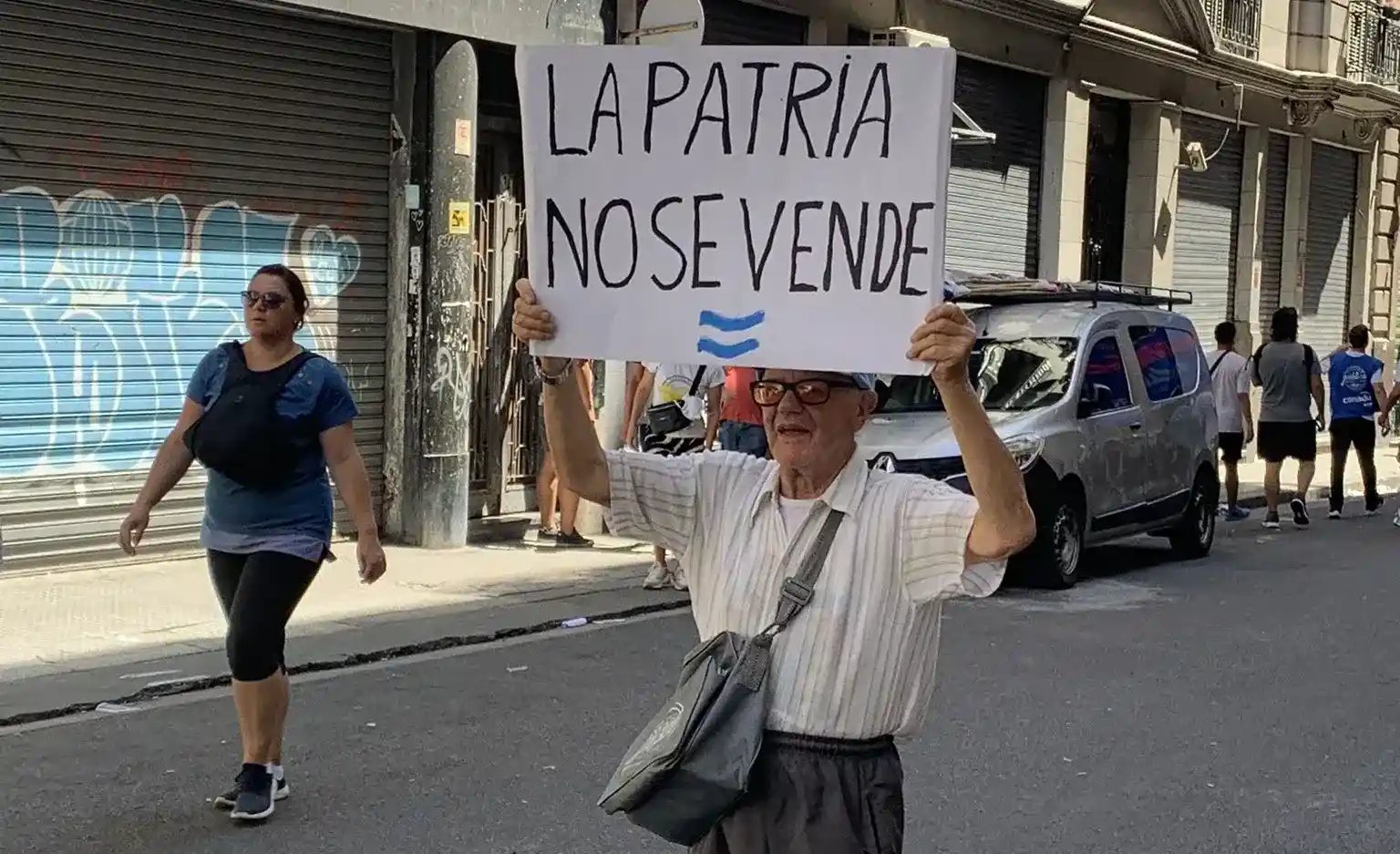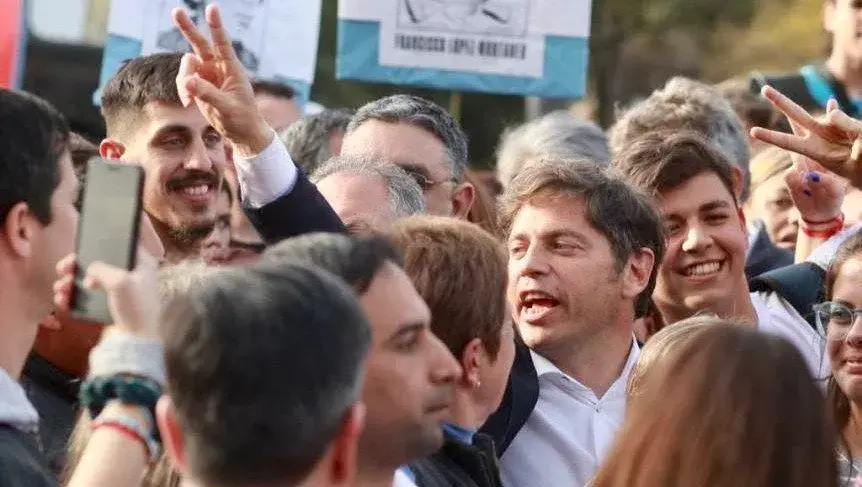The mobilizations oppose the austerity plan undertaken by the government of Javier Milei, as well as the attempt to grant extraordinary powers to the president.

President Javier Milei’s plan to dismantle the State faced a massive rejection this Wednesday, as thousands of people marched in Buenos Aires and other cities of Argentina. The protesters opposed the Government’s mega law in Congress and the decree with hundreds of measures that have already taken effect, which would grant Milei special legislative powers and deregulate the struggling Argentine economy. A general strike that will last until midnight, the first one to challenge this Government, also began at 12:00 (local time).
In front of Congress, where the General Confederation of Labor (CGT), the biggest union center in Argentina, had summoned a rally to support the general strike this Wednesday, the most repeated chant was “The country is not for sale”.

Thousands of people filled Mayo Avenue, a central street that links Congress with the Casa Rosada, the seat of the Executive. Among them were truck drivers, health workers, State employees, as well as hundreds of pensioners, tenants, theater groups, book publishers, environmentalists and advocates for the rights of people with disabilities. The Peronist Unión por la Patria and the Left and Workers’ Front also joined the protest. They all had reasons to reject a megalaw that affects every sector of the national economy with its more than 500 articles.
The protest was confronted with a heavy security operation that aimed to fulfill one of the Government’s priorities: to keep the traffic in the capital flowing despite the demonstrations. Since December, the Government has enforced a protocol against protests, which warns that protest leaders who block roads will be arrested and even charged for the “operational costs” of the police. The officers can also inspect transport to find protesters, and this morning they stopped the buses that entered the capital and blocked the passage of those who tried to cross a bridge on foot in the south of the city.
The CGT estimated that the strike had an 80% adherence among its affiliates across the country. The unions had also predicted a few days ago that at least 40,000 people would gather in the center of Buenos Aires for the march along with the strike, twice as many as in the last CGT rally, in December. However, this Wednesday, the union significantly increased the number and claimed that 600,000 people had participated, while the Government did not provide any figures. The protest resonated throughout the country and even abroad, such as in Italy, where a group of demonstrators showed up at the Argentine Embassy in Rome.
The tension between the police and the protesters escalated soon in Buenos Aires. Around one in the afternoon in Buenos Aires (four more hours in mainland Spain), while a group of people yelled against the Milei law in front of Congress, federal agents dispersed the crowd by pushing them to clear a lane of the Callao street for the cars to pass. Minutes later, gendarmerie forces arrived to shut the doors of the Legislative Palace amid boos and insults from the protesters.
The CGT organized a strike and a demonstration against the first actions of the Milei Government, which, in less than a month and a half, devalued the currency by more than 50%, enacted a decree with more than 300 measures and submitted to Congress a law with more than 600 articles that got a favorable report in committees early this Wednesday and will be put to a vote in the Chamber of Deputies.
President Javier Milei faced the third large-scale protest and the first strike by the country’s main union confederation in five years: the previous one was in 2019 during the conservative government of Mauricio Macri.
The strike started at noon. Unions said that hospitals had minimal staff and services such as garbage collection or street cleaning were disrupted by the action. The strike on public transport – buses, metro and trains – would start at 7:00 p.m. to “allow the protesters to gather and disperse”, as the unions explained. The airports remained operational, but some airlines, such as Aerolíneas Argentinas, the national carrier, cancelled or rescheduled flights: more than 20,000 passengers were affected. Moreover, in WhatsApp groups, the idea of not buying from “any business” that was open was shared.

The Government downplayed the impact of the strike and the demonstration. Patricia Bullrich, Minister of Security, said that the effect of the action was “minimal” compared to the number of people who “chose to work”. “I see images of the whole country open and working,” Bullrich said. “No one intimidates us, especially a march of 40,000 people. They are 0.5% of eight million workers, they are irrelevant,” she argued. The minister also oversaw the enforcement of the anti-protest protocol that her administration established to prevent roadblocks and the heavy security deployment in the center of the Argentine capital.
Bullrich was expected to meet with Milei at the end of the day at the presidential residence, in Olivos, “to review the events,” according to presidential spokesman Manuel Adorni, who also said that “the strike day would be deducted” from the workers who joined. The spokesman called the action “senseless” and encouraged businesses and workers who did not support it to “continue their activities as usual.”
The strike was a sign of opposition to the measures that the Milei Government implemented since it took office at the Casa Rosada. In addition to the drastic adjustment that the Minister of Economy, Luis Caputo, announced a few days after taking office, with a 50% devaluation of the currency and the elimination of subsidies for energy and transportation, two huge measures were later added. The first was a decree of necessity and urgency that is effective, but is being challenged in court by those who deem it “unconstitutional”—a court already halted the labor reform included in the decree. Later, the president sent to Congress a bill with more than 600 articles that will be voted on in Congress in special sessions.
Union leaders hoped that the strike and demonstration would convince opposition deputies to reject the president’s megalaw. “We ask the deputies to have dignity and principles. “Don’t betray the workers, the pensioners, those who have less,” union leader Pablo Moyano demanded this Wednesday from a stage near Congress. The proposal got a favorable report in committees early this Wednesday and will start to be debated in the chamber this Thursday. However, the opposition deputies who backed the proposal did so in disagreement, that is, with objections to some of the points in the latest version of the text. Lawmakers will discuss each article individually in the Chamber of Deputies and the proposal could fail there, where the ruling party is a minority.







